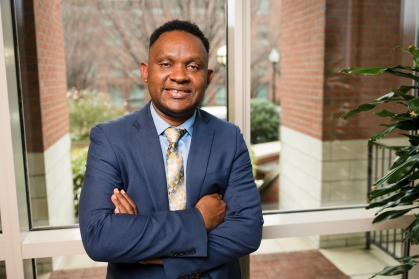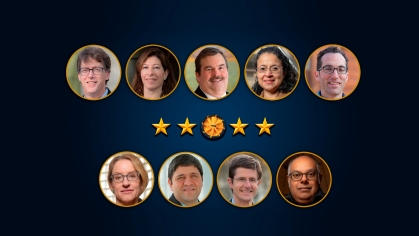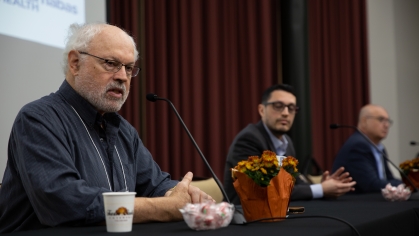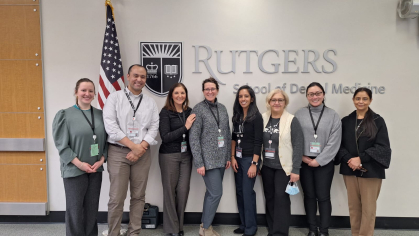Oncology Researcher to Join Rutgers Global Health Institute
Wilfred Ngwa, named a Rutgers Presidential Faculty Scholar and a professor of global health, advises the Biden Administration’s Cancer Cabinet

Wilfred Ngwa, a global oncology researcher and medical physics expert who is developing technologies that integrate with radiation therapy to reduce cancer treatment times and costs, will join Rutgers Global Health Institute.
Ngwa, who will become a Rutgers Presidential Faculty Scholar and a professor of global health at the institute in January, also will be appointed as a professor in the Department of Radiation Oncology at the Rutgers Cancer Institute of New Jersey and Rutgers Robert Wood Johnson Medical School.
The broad aim of Ngwa’s research and global collaboration is to increase access to cancer treatment and reduce health disparities, particularly in low- and middle-income countries. He leads a research group that is developing low-cost approaches and technologies that can substantially reduce treatment times and costs and that can be implemented in resource-poor settings.
One such technology incorporates artificial intelligence and smart radiotherapy biomaterials, such as nanoparticle drones that can be injected intravenously and will emit missile-like electrons when activated by photon beams during radiation therapy. This process is designed to increase damage to cancerous tumors while minimizing toxic effects on body tissues. This technology also can be programmed to sustainably deliver cancer-fighting immunotherapy drugs in resource-effective and measurable ways. This research is supported by the National Institutes of Health and industry partners and is in clinical translation, with multisite clinical trials on track to begin in 2023.
Ngwa’s overall research program is designed to address many types of cancer, and he is leading studies related to treating prostate, breast, and cervical cancers in Nigeria, South Africa, Tanzania and the United States.
“Expanding our multicenter clinical trials to additional U.S. and African institutions will be a focus of my research at Rutgers. Implementation research also will be a priority, so that we can turn knowledge into real-world actions that will improve health care delivery and global health,” Ngwa said. “By building on my work with radiotherapy and the use of advanced information and communication technologies in oncology care, I look forward to developing a vibrant research program at Rutgers.”
Ngwa is widely regarded as an expert on public health policy and cancer control in sub-Saharan Africa. Since 2019, he has been the chair of The Lancet Oncology commission on cancer in sub-Saharan Africa, which in the spring published its report about the rapidly escalating cancer burden in this resource-poor area of the world. Ngwa is an external adviser to the U.S. presidential administration’s Cancer Cabinet, convened by President Joe Biden to help establish and make progress on the administration’s reignited Cancer Moonshot initiative, and he is a co-chair of the U.S. Cancer Moonshot 2.0 Lancet Oncology commission. He is editor of IOP Publishing’s scientific series in global health and radiation oncology and an editorial board member for Journal of Global Oncology, Frontiers in Oncology and ecancermedicalscience.
As the founding director of the Global Health Catalyst Summit, Ngwa leads a collaborative that convenes an annual summit and other events designed to catalyze high-impact international collaborations and initiatives to eliminate health-related disparities in the U.S. and globally. An ongoing project that originated via a summit is C4: Comprehensive Cancer Center in the Cloud, an artificial intelligence-driven platform that Ngwa is developing with multidisciplinary partners to increase access to cancer care, research and education regardless of geographic location.
Ngwa is originally from Cameroon, where he studied physics and computer science at the University of Buea, receiving a bachelor of science degree. He earned his master’s and doctoral degrees from University of Leipzig in Germany then completed postdoctoral education and training in radiation oncology at MD Anderson Cancer Center at the University of Texas and at Brigham and Women’s Hospital, Dana-Farber Cancer Institute and Harvard Medical School.
Since 2019, Ngwa has been an associate professor of radiation oncology and molecular radiation sciences at Johns Hopkins University’s School of Medicine and Sidney Kimmel Comprehensive Cancer Center. He also holds an appointment as a distinguished professor of public health at the ICT University, based in Cameroon.



